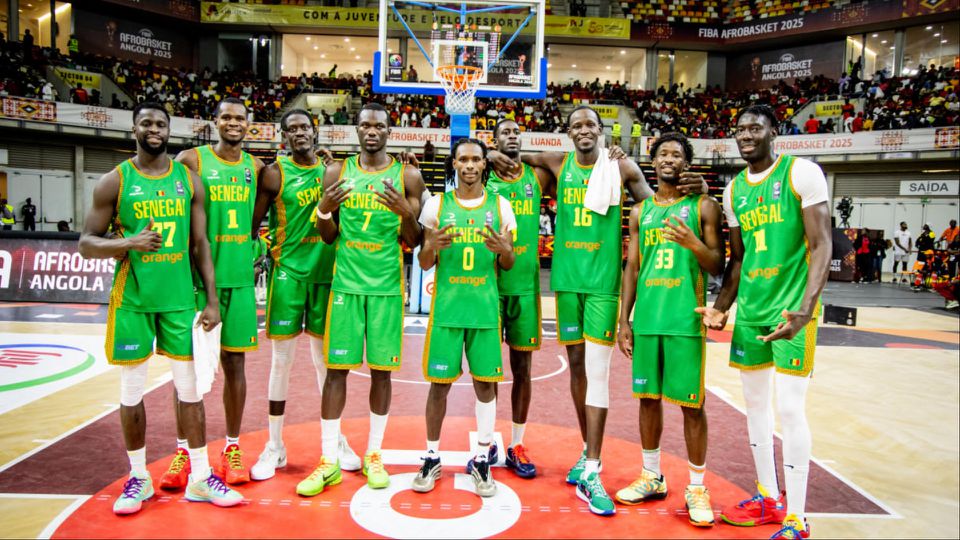In Luanda the roar told its own story, a nation back on the summit as the hosts crushed Mali 70-43 to reclaim the crown at the 2025 AfroBasket. From the first tip to the final buzzer, Angola’s composure, depth and defensive edge carried them to a perfect run, a twelfth continental title, and a celebration that pulsed through the sold-out Kilamba Arena.
A night Angola had been waiting for
Angola finished 6-0, the only undefeated team in the tournament, and they did it at home in front of 12,700 fans for a third straight sellout. It was their first African title since 2013, a full-circle moment that ended Tunisia’s recent reign and reasserted the Palancas Negras as the continent’s gold standard.
The final was not just a win, it was control. Angola led from the outset and never trailed, answering every Malian run with poise. When the lead climbed past 20 in the third quarter, the fans rose in a joyous Mexican wave, a release of twelve years of waiting. The scoreboard read 70-43 at the end, the widest margin in an AfroBasket final in recent memory, and Mali’s 43 points were the fewest by a finalist in three decades.
How the final was won
Angola established rhythm early, taking the opening quarter 14-10, then tightened the screws in the second 18-10 to reach halftime up 32-20. The third quarter broke the game open, a 19-11 surge that stretched the lead to 19. Even when Mali probed in the fourth, Angola kept their shape, closed lanes, and finished the last period 19-12 to seal a 27-point victory.
The numbers told the same story as the eye test. Angola outrebounded Mali 54-36 and punished mistakes, turning 24 Malian turnovers into 22 points. Mali’s usual strengths were stifled, their rhythm disrupted, and their creators contained. Siriman Kanoute was forced into a tournament-high turnover total and Mahamane Coulibaly, a knockout-round catalyst, finished 1-of-9 for two points as Angola’s help coverage rotated on time and the hands stayed active.
Dundao the heartbeat
On a floor filled with giants, the shortest player was the loudest voice. Childe Dundao, the 5-foot-6 point guard and tournament MVP, authored another poised performance, leading Angola with 16 points and 5 assists in 33 minutes and 33 seconds. He was the pulse, directing traffic, picking pockets, and steadying possessions when Mali threatened to unsettle the game.
Dundao’s week was a masterclass in leadership. He had carried Angola through the tense quarterfinal against Cape Verde with 30 points, then steadied the semifinal against Cameroon with key plays in a one-point win. In the final he needed only efficiency and timing, letting the defense and depth do the heavy lifting while he made the right play over and over again.
There were co-stars. Selton Miguel added 12 points, a perfect foil with straight-line drives and confident midrange touches, while Eduardo Francisco chipped in nine timely points that kept the scoreboard moving. This was the identity Angola rode all tournament, a collective with clear roles, anchored by a relentless perimeter that funneled everything into help.
Mali’s breakthrough and the lessons ahead
For Mali, defeat came with pride and perspective. They finished 4-3, reached the AfroBasket final for the first time in their history, and proved they belong on the continent’s top tier. Aliou Diarra averaged a double-double across the event and worked to 11 points in the final, while Siriman Kanoute led their scoring with 14. The bracket will also remember their overtime classic against Côte d’Ivoire in the quarterfinals, powered by Diarra’s towering display.
On Sunday, the walls closed in. Angola’s pressure and glass dominance limited second chances, and Mali’s 18 turnovers in the opening quarter of the contest underscored how hard it was to establish tempo. Still, the run has a glow. Mahamane Coulibaly impressed in earlier knockout games, Diarra collected the best rebounder award, and this group gained the kind of experience that seeds belief for the next cycle.
Senegal’s bronze on a record night
Earlier in Luanda, Senegal poured the perfect response to semifinal heartbreak, beating Cameroon 98-72 to secure a third straight third-place finish. The night belonged to Jean-Jacques Boissy, who set a new AfroBasket single-game scoring record with 40 points, the exclamation mark on a wire-to-wire performance that steadied the Lions of Teranga and delighted the neutral crowd.
Senegal started with urgency, taking the first quarter 28-14, then pushed the margin to 49-26 by halftime with a 19-12 second period. They kept the foot down with a 31-22 third, and although Cameroon won the fourth 24-20, the gap never closed. Around Boissy’s 40, Brancou Badio added 18 and Ibou Badji provided interior punch with 12 and seven rebounds, a trio that set the tone on both ends.
The stat sheet backed the dominance. Senegal outrebounded Cameroon 48-37, outscored them 38-30 in the paint, turned second chances into 23-12, and feasted on mistakes with a 20-1 edge in points off turnovers. It was the clarity they needed after an 88-80 semifinal loss to Mali, and it echoed the belief built in a 91-75 quarterfinal win over Nigeria earlier in the week.
Cameroon show they belong in the last four
Cameroon’s tournament arc had its own surge. In the quarterfinal they overwhelmed Egypt 95-68 with sharp execution and a stifling defensive start, an 11-0 run in the first quarter announcing intent. Captain Fabien Ateba buried 5-of-9 from deep on the way to 26 points, Jeremiah Hill returned from a leg knock to score 18, and Brice Bidias delivered 12 off the bench to secure a first semifinal since 2009.
Injuries were a constant subplot, with Hill, Jordan Bayehe and Williams Narace managing fitness through the knockout rounds. Even so, the Indomitable Lions stood toe-to-toe with the hosts in a 74-73 semifinal that could have gone either way. The bronze game arrived less than 24 hours later, and the emotional toll was visible in a slow start that Senegal exploited.
There was pride and perspective in the aftermath. Bayehe distilled their plan against Egypt with a simple truth, defense was the key, discipline in the first two quarters set the platform, and reaching the last four for the first time since 2009 felt huge. Across the floor, Egypt center Anas Mahmoud rued a night where nothing stuck, conceding that open shooters, transition leakages and offensive rebounds told the tale.
Stars, awards and a tournament to remember
Individual brilliance dotted the bracket. Dundao was voted tournament MVP and headlined the All-Tournament Team, where he was joined by teammate Bruno Fernando, the Malian duo of Aliou Diarra and Mahamane Coulibaly, and Senegal’s captain Brancou Badio. It was a selection that mirrored the event’s storyline, guards steering rhythm, bigs controlling space, and leadership shining under pressure.
There were special honors too. Madagascar received the Fair Play award, Diarra was recognized as the leading rebounder, and Badio finished as both the leading scorer and the leading three-point shooter at 38.5 percent. This was a festival that celebrated role acceptance, toughness, and the capacity to perform when cameras, and expectations, are at their brightest.
Angola’s blueprint and what comes next
What makes this Angolan run resonate is how it was built. They defended first, owned the glass, valued the ball, and trusted a small guard to be their big voice. Dundao’s rise from sparkplug to floor general became the tournament’s beating heart, a story of persistence that matched the crowd’s faith. This title did not erase the years since 2013, it gave them meaning, a reminder that tradition is not a burden when the identity is clear.
For Mali, the path looks promising. A first final, a standout in Diarra, and a guard line that can trouble anyone. For Senegal, a podium built on resilience and a record night from Boissy that generations will remember. For Cameroon, a semifinal return and the knowledge that their ceiling is higher than heartbreak. The 2025 stage, in the end, belonged to Angola, but the echo of these performances will carry into qualifiers and the next AfroBasket cycle.
Final standings at a glance
- 1. Angola 6-0
- 2. Mali 4-3
- 3. Senegal 5-2
- 4. Cameroon 4-3
- 5. Nigeria 3-1
- 6. Egypt 3-1
- 7. Côte d’Ivoire 3-1
- 8. Cape Verde 3-2
- 9. Guinea 2-2
- 10. South Sudan 1-3
- 11. Congo DR 1-3
- 12. Tunisia 1-3
- 13. Rwanda 0-3
- 14. Madagascar 0-3
- 15. Uganda 0-3
- 16. Libya 0-3
Key game details
- Final, Angola 70-43 Mali, quarter splits 14-10, 18-10, 19-11, 19-12
- Bronze game, Senegal 98-72 Cameroon, quarter splits 28-14, 19-12, 31-22, 20-24
- Cameroon quarterfinal, 95-68 vs Egypt, Ateba 26 with 5 triples, Hill 18
The last image will linger, Dundao cradling the ball as the horn sounded, the arena in full voice, and a nation wrapped in red and black finally exhaling. Angola rule Africa again, and the rest of the continent will spend the next two years plotting how to take the crown from Luanda’s proud hands.





